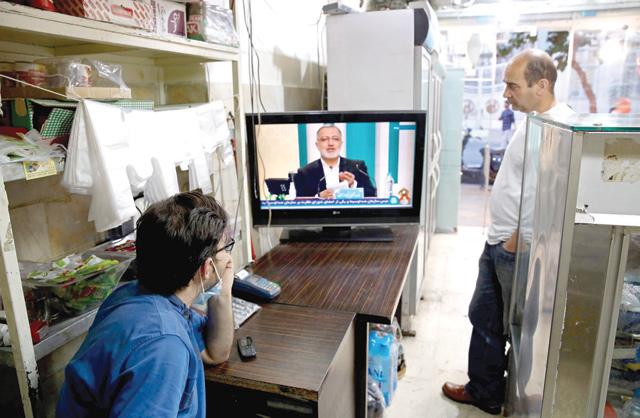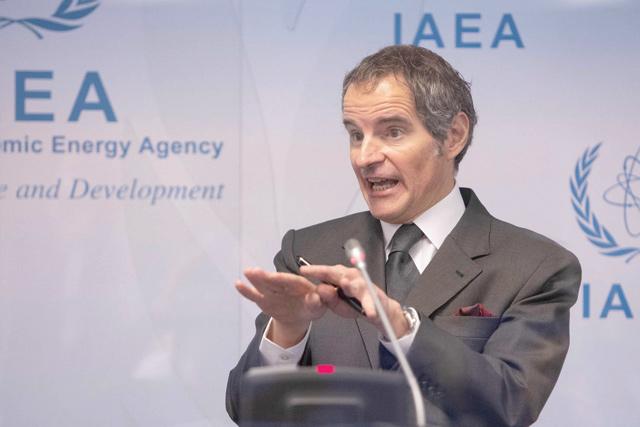You are here
'Space narrowing' for temporary Iran nuclear agreement — IAEA
By AFP - Jun 08,2021 - Last updated at Jun 08,2021

Iranians watch candidate Alireza Zakani speaking during the first televised debate between Iran presidential candidates, at a shop in Tehran, on Saturday (AFP photo)
VIENNA/ WASHINGTON — The UN nuclear watchdog's head said Monday it was "becoming increasingly difficult" to extend a temporary inspections arrangement with Iran, as Tehran and world powers try to salvage a nuclear deal.
In February, Tehran suspended some IAEA inspections, leading the agency to strike a temporary three-month deal allowing it to continue its activities despite the reduced level of access.
"I can see this space narrowing down," International Atomic Energy Agency [IAEA] Director General Rafael Grossi told journalists in Vienna at the beginning of the quarterly meeting of the IAEA's board of governors.
In late May the ad hoc arrangement was extended until June 24, with Grossi describing the remaining time as "very short".
Referring to negotiations underway in central Vienna between world powers and Tehran on the possible revival of the international 2015 deal on Iran's nuclear programme, Grossi said he hoped that by "wider general agreement that's being worked on downtown or by some other means, we are not going to see our... inspection capacities curtailed any more".
"We cannot limit and continue to curtail the ability of the inspectors to inspect and at the same time pretend that there is trust," he said.
He also referred to a long-running attempt by the IAEA to get clarity on several undeclared Iranian sites where nuclear activity may have taken place, mostly in the early 2000s.
In April the IAEA launched a new process of "technical discussions" with Iran in an effort to "break the impasse" over the sites.
But a report issued last week made clear that the IAEA's queries had not been resolved.
Grossi said Monday that his "expectations were not met" and that there had been no "concrete progress" on the issue, despite the Iranian authorities' stated willingness to cooperate.
"Talk must lead to conclusions," he said.
While stressing that the issue of the undeclared sites and the broader talks to revive the 2015 deal were not directly connected, Grossi underscored the importance of trust.
“This is where everything you do with any country is interconnected,” he said.
“For me the road to trust goes through information, clarification, inspections and full transparency,” he added.
Diplomats are hoping to conclude the talks on reviving the 2015 deal before Iran’s presidential election on June 18.
The deal has been disintegrating ever since former US President Donald Trump dramatically withdrew from it in 2018 and went on to re-impose swingeing sanctions on Iran.
In retaliation Iran has been disregarding limits laid down in the deal on its nuclear activities.
Grossi reiterated on Monday that the situation in Iran was “serious”.
“We have a country that has a very developed and ambitious nuclear programme which is enriching at very high levels... very close to weapons grade,” he said.
Meanwhile, the United States said on Monday it was not even sure if Tehran really wanted to come back into compliance.
“We’ve been engaged in indirect conversations, as you know, for the last couple of months, and it remains unclear whether Iran is willing and prepared to do what it needs to do to come back into compliance,” Secretary of State Antony Blinken told the House Foreign Affairs Committee.
“We’re still testing that proposition,” Blinken said.
“We’re not even at the stage of returning to compliance for compliance,” Blinken said. “We don’t know if that’s actually going to happen.”
Related Articles
VIENNA — The UN nuclear watchdog on Monday voiced concern that Iran had not clarified queries over possible undeclared nuclear activity, add
VIENNA — Iran accused the UN nuclear agency on Thursday of having taken "a counterproductive approach" after its head said Tehran had not c
VIENNA — The UN nuclear watchdog and Iran have agreed to extend an understanding to monitor Tehran's activities by one month, the agency sai

















